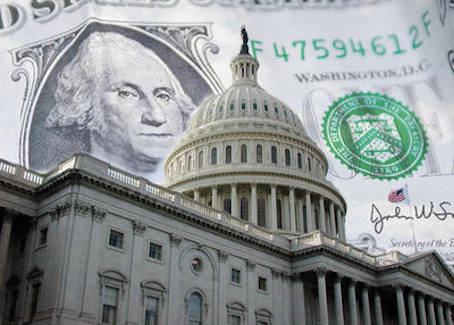Secret-money groups, some with Southern ties, may have broken election laws

A watchdog group has filed complaints against 10 "social welfare" nonprofits for allegedly breaking campaign finance laws. Six of the nonprofits are also targets of a criminal complaint submitted to the FBI and Justice Department accusing them of lying to the IRS. (Image is from Every Voice.)
Nonprofits that spend on elections but are not required to disclose their donors have grown dramatically in number since 2010, when the U.S. Supreme Court issued its Citizens United v. Federal Elections Committee decision loosening restrictions on money in politics. That year, secret-money groups spent roughly $7.2 million on federal elections, according to the Center for Responsive Politics. So far in the current election cycle, they have spent more than five times as much — $36.9 million, already surpassing the 2014 total.
But as nonprofit political activity has increased, many of these so-called "social welfare" nonprofits appear to have broken campaign finance laws — and watchdog groups are demanding the government take action.
This week Citizens for Responsibility and Ethics in Washington (CREW) filed IRS complaints against 10 of these 501c4s for allegedly violating their nonprofit status. CREW also filed criminal complaints with the Federal Bureau of Investigation and the U.S. Department of Justice, asserting that six of the groups may have lied to the IRS. Three of the 10 groups have Southern ties, with two of them making political expenditures in the region and a third based there. Nine of the 10 groups are conservative, and some have ties to the Koch brothers' conservative political spending network. CREW is chaired by Democratic operative David Brock.
CREW alleges that some of the groups hid hundreds of thousands of dollars in political spending from the IRS and most devoted more than 60 percent of their spending to political activity — a violation of requirements that the primary activity of 501c4s must be the promotion of social welfare and not political activity.
"These groups have demonstrated a clear disregard for the law," CREW Executive Director Noah Bookbinder said. "If the government does not act, it will send a signal to dark-money groups that no laws or limits apply to them and it is open season for secret money in our elections."
Here are the groups targeted by CREW that have Southern ties:
* The American Dream Initiative (ADI) was founded in 2013 in Alexandria, Virginia, but has been active in Texas. It spent over $500,000 in 2014 attacking Republican Ken Paxton in a GOP runoff to choose the party's nominee for Texas attorney general — an amount that represented 83 percent of the group's spending that year. Dan Backer, the group's executive director, is an attorney known for winning the Supreme Court case McCutcheon v. Federal Election Commission, which ended overall campaign and party contribution limits for individuals, and for running numerous outside political groups. ADI is funded in part by the Judicial Crisis Network, which has spent money opposing President Obama's Supreme Court nominees, and by the Koch-funded Wellspring Committee, which has made big donations to the Judicial Crisis Network and to other groups cited in CREW's latest complaints. ADI is named in the criminal complaint for its considerable electioneering, none of which it reported to the IRS.
* Based in Ohio, the Jobs and Progress Fund (JPF) has been active in Georgia, donating over $1.8 million to super PACs and contributing $400,000 for TV ads attacking a candidate in a runoff for the state's 2014 Republican U.S. Senate primary. The group failed to report the ad buys as political expenditures, which is why it's named in CREW's criminal complaint. In addition, JPF's combined donations and political expenditures accounted for 69 percent of its expenses over a one-year period, a violation of the 501c4 50-percent rule.
* Organized in Virginia but active in Wisconsin, the Rule of Law Project (ROLP) spent close to $200,000 on a TV ad benefiting a Republican candidate for Wisconsin attorney general but failed to disclose this spending to the IRS. It is also named in CREW's criminal complaint. ROLP got $100,000 from the Judicial Crisis Network between 2013 and 2014 and $30,000 from the Koch-funded Wellspring Committee in 2014.
The other groups named in the complaints are the Arizona Future Fund; the Ohio-based groups Freedom Vote, Mid America Fund, and Moving Ohio Forward, the lone liberal outfit named in the complaints; Michigan Citizens for Fiscal Responsibility; and Oklahomans for a Conservative Future (OCF). One known donor to OCF is North Carolina-based tobacco giant Reynolds American; OCF co-founder Stephanie Milligan used to be a registered lobbyist for the company.
If recent history is any guide, the IRS — hobbled by budget cuts and increased scrutiny from Congress after allegedly delaying tax status approval of conservative groups — is unlikely to take up CREW's charges.
But there's reason to believe the FBI and Department of Justice may be more responsive. The agencies worked together on case that led to the 2015 conviction of a campaign operative in the first U.S. prosecution for illegal coordination of contributions between political committees. Tyler Harber, the campaign manager for Chris Perkins' failed 2012 run for Congress from Virginia, was sentenced to two years in prison for his role in coordinating between Perkins' campaign and a super PAC supporting him.
Tags
Alex Kotch
Alex is an investigative journalist based in Brooklyn, New York, and a reporter for the money-in-politics website Sludge. He was on staff at the Institute for Southern Studies from 2014 to 2016. Additional stories of Alex's have appeared in the International Business Times, The Nation and Vice.com.
